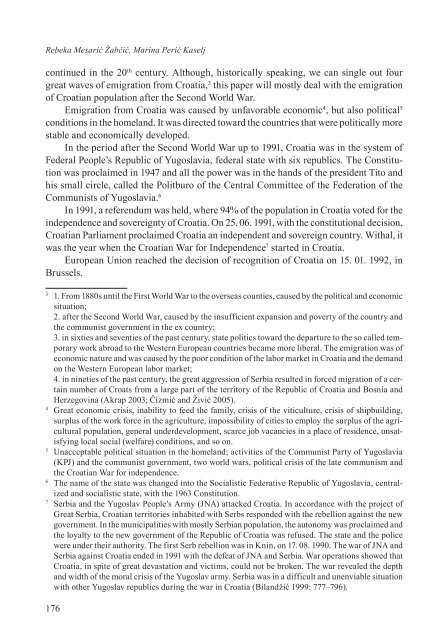30 • 2009 - Dve domovini / Two Homelands - ZRC SAZU
30 • 2009 - Dve domovini / Two Homelands - ZRC SAZU
30 • 2009 - Dve domovini / Two Homelands - ZRC SAZU
Create successful ePaper yourself
Turn your PDF publications into a flip-book with our unique Google optimized e-Paper software.
Rebeka Mesarić Žabčić, Marina Perić Kaselj<br />
continued in the 20 th century. Although, historically speaking, we can single out four<br />
great waves of emigration from Croatia, 3 this paper will mostly deal with the emigration<br />
of Croatian population after the Second World War.<br />
Emigration from Croatia was caused by unfavorable economic 4 , but also political 5<br />
conditions in the homeland. It was directed toward the countries that were politically more<br />
stable and economically developed.<br />
In the period after the Second World War up to 1991, Croatia was in the system of<br />
Federal People’s Republic of Yugoslavia, federal state with six republics. The Constitution<br />
was proclaimed in 1947 and all the power was in the hands of the president Tito and<br />
his small circle, called the Politburo of the Central Committee of the Federation of the<br />
Communists of Yugoslavia. 6<br />
In 1991, a referendum was held, where 94% of the population in Croatia voted for the<br />
independence and sovereignty of Croatia. On 25. 06. 1991, with the constitutional decision,<br />
Croatian Parliament proclaimed Croatia an independent and sovereign country. Withal, it<br />
was the year when the Croatian War for Independence 7 started in Croatia.<br />
European Union reached the decision of recognition of Croatia on 15. 01. 1992, in<br />
Brussels.<br />
3<br />
1. From 1880s until the First World War to the overseas counties, caused by the political and economic<br />
situation;<br />
2. after the Second World War, caused by the insufficient expansion and poverty of the country and<br />
the communist government in the ex country;<br />
3. in sixties and seventies of the past century, state politics toward the departure to the so called temporary<br />
work abroad to the Western European countries became more liberal. The emigration was of<br />
economic nature and was caused by the poor condition of the labor market in Croatia and the demand<br />
on the Western European labor market;<br />
4. in nineties of the past century, the great aggression of Serbia resulted in forced migration of a certain<br />
number of Croats from a large part of the territory of the Republic of Croatia and Bosnia and<br />
Herzegovina (Akrap 2003; Čizmić and Živić 2005).<br />
4<br />
Great economic crisis, inability to feed the family, crisis of the viticulture, crisis of shipbuilding,<br />
surplus of the work force in the agriculture, impossibility of cities to employ the surplus of the agricultural<br />
population, general underdevelopment, scarce job vacancies in a place of residence, unsatisfying<br />
local social (welfare) conditions, and so on.<br />
5<br />
Unacceptable political situation in the homeland; activities of the Communist Party of Yugoslavia<br />
(KPJ) and the communist government, two world wars, political crisis of the late communism and<br />
the Croatian War for independence.<br />
6<br />
The name of the state was changed into the Socialistic Federative Republic of Yugoslavia, centralized<br />
and socialistic state, with the 1963 Constitution.<br />
7<br />
Serbia and the Yugoslav People’s Army (JNA) attacked Croatia. In accordance with the project of<br />
Great Serbia, Croatian territories inhabited with Serbs responded with the rebellion against the new<br />
government. In the municipalities with mostly Serbian population, the autonomy was proclaimed and<br />
the loyalty to the new government of the Republic of Croatia was refused. The state and the police<br />
were under their authority. The first Serb rebellion was in Knin, on 17. 08. 1990. The war of JNA and<br />
Serbia against Croatia ended in 1991 with the defeat of JNA and Serbia. War operations showed that<br />
Croatia, in spite of great devastation and victims, could not be broken. The war revealed the depth<br />
and width of the moral crisis of the Yugoslav army. Serbia was in a difficult and unenviable situation<br />
with other Yugoslav republics during the war in Croatia (Bilandžić 1999: 777–796).<br />
176

















